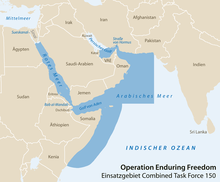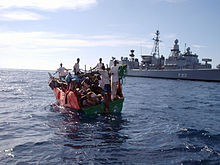Operation Enduring Freedom
The Operation Enduring Freedom ( OEF , English for "ongoing operational freedom") was the first and only large-scale military operation in the framework of 2001 proclaimed by the United States war against terrorism . The operation was carried out in four regions: Afghanistan , the Horn of Africa , the Philippines, and Africa inside and south of the Sahara. Germany participated militarily with units of the Navy in the operation in the Indian Ocean. Participation in the partial operation in Afghanistan has also ended. Bundeswehr units stationed there were only part of the separate ISAF troops. The main military actor in Operation Enduring Freedom was the United States armed forces , but many US allied forces participated in it.
The operation should originally be called " Operation Infinite Justice " ( English Operation Infinite Justice ). After Muslim groups protested that, from an Islamic point of view, justice was to be settled solely with Allah, the title was changed.
Operation Enduring Freedom ended on December 28, 2014. In Afghanistan, the ISAF was also completed and replaced by the supporting Resolute Support Mission (RSM), which the US armed forces refer to as Operation Freedom's Sentinel. The previous sub-operation called Operation Enduring Freedom - Horn of Africa (OEF-HOA) has been replaced in the US armed forces by the Combined Joint Task Force-Horn of Africa (CJTF-HOA).
legitimation
In response to the terrorist attacks of September 11th, the United States declared the so-called war on international terrorism. One of the measures taken as part of this war is Operation Enduring Freedom. It began on October 7, 2001 and aims to eliminate terrorist command and training institutions, fight terrorists, capture them and bring them to justice. In addition, third parties should be permanently prevented from supporting terrorist activities.
Around 70 nations are now involved in the operation. It is led by the American regional command USCENTCOM with headquarters in Tampa / Florida.
Resolution 1368 of the United Nations Security Council of September 12, 2001 is used as the legal basis . This resolution condemned the events of September 11, 2001 as atrocious terrorist attacks and as a threat to international peace and security. The resolution reaffirms the right to individual and collective self-defense and confirms the need to take all necessary steps against future threats.
The NATO Council then decided to classify the attacks of September 11, 2001 as an attack on the United States under Article 5 of the Washington Treaty . It stipulates that an armed attack against one or more of them (meaning the contracting parties) in Europe or North America will be regarded as an attack against them all.
On October 7, 2001, American and British forces began Operation Enduring Freedom (OEF) in Afghanistan.
German contribution
Germany participated in Operation Enduring Freedom from the start. The first OEF mandate of the Bundestag from November 16, 2001 provided for five individual German contributions with up to 3900 soldiers:
- NBC defense forces, approx. 800 soldiers,
- Medical staff, approx. 250 soldiers,
- Special forces, approx. 100 soldiers,
- Air transport forces, approx. 500 soldiers,
- Naval forces including sea air forces, approx. 1800 soldiers,
- required support forces, approx. 450 soldiers.
The area of operation was specified in accordance with Article 6 of the North Atlantic Treaty , the Arabian Peninsula, Central and Central Asia, Northeast Africa and the adjacent sea areas.
The Bundeswehr's mandate for OEF was reviewed annually by the Bundestag. The contingent was gradually reduced, for example on November 13, 2008 with regard to the number of soldiers from 1,400 to 800 and with regard to the area of operation to the Horn of Africa. Central and Central Asia, the Arabian Peninsula and Northeast Africa are no longer part of the operational areas. The deployment of 100 soldiers from the Special Forces Command (KSK) in Afghanistan was also no longer mandated. The downsizing of the OEF mission is offset by an increase in the mandate of the ISAF troops in Afghanistan, whose German contingent has been increased.
The German contribution ended on June 29, 2010. On November 10, 2010 it was announced that the mandate for participation in the anti-terrorist operation Enduring Freedom is to expire officially.
Naval operation in the Horn of Africa
The area of operation
The Horn of Africa is the name given to the eastern tip of Africa belonging to Somalia , not to be confused with Cape Horn on the southern tip of South America. The operational area of the OEF sub-operation "Horn of Africa" (HOA) extends from the southern tip of the Sinai peninsula in the Red Sea along the east coast of Africa to the Somali-Kenyan border and in the east along the Arabian peninsula to the Strait of Hormuz in the Gulf from Oman and further east along the Pakistani coast to around Karachi. From the coasts the area of operations extends several hundred miles into the open sea and, with its pure water surface, is about three times the size of the Mediterranean Sea or eight times the size of the Federal Republic of Germany.
Some of the most important sea trade routes in the world run through the operation area to the Suez Canal . These include the oil route from the Persian Gulf to the Mediterranean and Europe and the shipping route from the Asia-Pacific region to Europe, at the eastern end of which are such important trading partners as India, the People's Republic of China, Japan and Australia.
Risks and Threats
The area of operations was bordered by a number of countries that were not stable and posed different threats.
In the south of the area was the collapsed state of Somalia, whose state power had collapsed. Sub-areas had declared themselves independent under the names Somaliland and Puntland . In the main part of Somalia, an Islamist movement called the Union of Islamic Courts seemed to prevail until it was driven out of the main cities with Ethiopian help in early 2007. It was assumed that Islamist terror groups used parts of Somalia as a retreat afterwards and set up bases there. Some ports on the Somali coast were used as bases by pirates off the Somali coast, and the adjacent sea areas were also considered to be at risk of piracy.
Yemen lies on the north side of the Gulf of Aden . In particular, the eastern parts of the country were not under strict government control from 2004 , even before the war in Yemen , and are regarded as safe haven for terrorists and fighters of independent groups. On October 6, 2002, the French tanker Limbourg was attacked by terrorists and badly damaged off the eastern coast of Yemen . Another well-known terrorist attack in Yemen was the attack on the US destroyer Cole on October 12, 2000.
In the Red Sea, the states of Eritrea and Sudan must be considered unstable. In the early summer of 2005, Sudan complained to the United Nations about Eritrean support for rebels in the border area.
Powers and tasks
The partial operation in the Horn of Africa by international naval forces, mostly from NATO -Staaten, performed in a as 150 (TF 150) Task Force (dt. Task force 150 ) Association designated are summarized. The unit's commander, Commander Task Force 150 (CTF 150) , is alternately provided by the participating nations, including several times from the German Navy. He reports to the headquarters of the naval forces of the US Central Command (USNAVCENT) in Manama, Bahrain.
Destroyers , frigates and supply ships form the core of the association, the composition of which is constantly changing. Reconnaissance planes and ships can take part in the operation, as can speedboats or submarines . The association monitors the large sea area and clarifies in particular the activities of irregular forces in the region. Ships that are considered to be particularly endangered can be protected by forces from TF 150, for example when they pass the Bab al-Mandab Strait at the southern entrance of the Red Sea. A hoped-for side effect of the presence of these forces in the region is the decline in piracy, but it has continued to increase.
The German contribution to the OEF partial operation in the Horn of Africa consisted essentially of a naval contingent that operated from Djibouti. Originally, speedboats, frigates, maritime patrols and auxiliary ships were used there. Later the contingent was based on a permanently participating frigate and temporarily deployed other forces such as B. Maritime patrols reduced. In Djibouti there is also a German liaison and support group , which will continue to exist as a logistical support unit for Operation Atalanta after the end of German participation in Operation Enduring Freedom . Participating soldiers were awarded the Bundeswehr Medal for their participation in Operation Enduring Freedom .
NBC defense forces in Kuwait
From 2001 to 2003, as part of the Combined Joint Task Force Consequence Management (CJTF CM), up to 259 soldiers, mostly from the NBC defense force from Bruchsal and Höxter , were stationed as NBC defense battalion Kuwait at the American Camp Doha in Kuwait . The soldiers' mission was to protect states in the region and the troops and coalition forces stationed there against Iraqi attacks with nuclear, biological or chemical weapons .
The NBC defense soldiers are internationally recognized as experts because of their training and technical equipment. You were u. a. Equipped with Fuchs - type detection tanks, rolling laboratories that can detect radioactivity and chemical substances in the air, on the ground and in the water, among other things. They had previously been brought to Kuwait by sea.
During the Iraq war in 2003 , shortly after the outbreak of war, Iraq fired missiles at targets in Kuwait, including the capital Kuwait City and Camp Doha , which was then the headquarters of the US-led coalition forces in Kuwait. The German soldiers were all unharmed. Once the German soldiers were used to investigate (sense) after rocket attacks by the Iraqis.
On May 6, 2003, after the main fighting had ended, the last of three contingents were transferred back to Germany. The last 59 men returned in June 2003 and ended the Kuwait mission of the German NBC defense forces after a year and a half.
See also
literature
- History guide: Horn of Africa . On behalf of the Military History Research Office, ed. by Dieter H. Kollmer and Andreas Mückusch. Paderborn, Munich, Vienna, Zurich, Ferdinand Schöningh 2007, 288 pages, ISBN 978-3-506-76397-6
Web links
- Information about Operation EnduringFreedom
- Operational area of OEF-HOA
- Information about the areas in which the Bundeswehr is deployed
- Official presentation by the Federal Government of Germany's commitment to centcom.mil ( Memento from June 12, 2008 in the Internet Archive ) (English)
Individual evidence
- ^ Application of the Federal Government of November 16, 2001 on Operation Enduring Freedom, BT-Drucks. 14/7296 of Nov. 7, 2001
- ^ Frankfurter Allgemeine Zeitung v. November 14, 2008, p. 4
- ↑ Article of the Bundeswehr press office Djibouti
- ↑ Cabinet decision to expire
- ^ DIW study: Piracy in Somalia serves many interests , DIW press release of July 21, 2010



